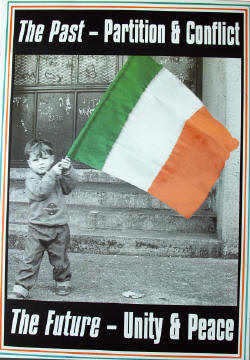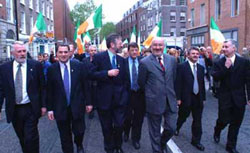 |
Irisch
Republikanische Solidarität
|
 |
US support sought as Colombia 3 ruling awaited
The Colombia Three ordeal may be brought to a close this
month, with a verdict from the trial judge due any day now.
Members of the Bring Them Home Campaign were in New York last
week to highlight the plight still facing the men after the
end of a trial that was tarnished by political statements by
high-ranking Colombian officials.
The three man have been in jail over three years on charges of
training rebels in Colombia's civil war.
The head of the campaign, Caitriona Ruane, said that the
three, Niall Connolly, James Monaghan and Martin McCauley,
would simply receive a letter from the judge, Jairo Acosta,
delivered to their prison cell. Judge Acosta requested extra
time to consider his decision, which under the Colombian
system he makes after summing up the evidence alone, without
deferring to a jury.
The three face terms of up to 20 years in prison if the judge
imposes the maximum sentence for the charge of training the
FARC -- left-wing Colombian guerillas - in bomb-making
techniques. But after a trial that saw the prosecution's main
allegations frequently countered by video and expert witnesses
on the defense side, Bring Them Home campaign members are
unwilling to offer a prediction of the trial's outcome.
Leading defense team lawyer Pedro Mahecha Avila said: "The
prosecution never had an argument and no evidence on the
training charge. . . . The defense presentation was precise
and convincing in relation to the presence of the men in
Ireland and Cuba."
Mr Avila was referring to the evidence provided by, among
others, an Irish diplomat and a humanitarian worker that
showed that the three men were in Belfast, Dublin or Havana on
dates that the prosecution said they were in FARC-controlled
territory.
Both Irish and American legal observers have repeatedly noted
in published findings the politicization of the trial by
senior Colombian government officials, including President
Alvaro Uribe Velez, who stated that the three men were "IRA
men," and the general of the Colombian Armed Forces, who, as
the trial ended with an obviously weak prosecution case,
called for the maximum sentence of 20 years to be imposed.
"We need the judge to be free from all pressure so that his
decision is based on the law and on justice," Mr Avila said.
It's understood that Judge Acosta has received death threats
from right-wing paramilitaries in Colombia, in an effort to
pressure him to impose the maximum sentence on the three men.
Observers have also called the prosecution case "sloppy." Ms
Ruane noted that the three men's first, uncontested charge was
of falsification of documents.
The three admitted that they were arrested while traveling on
passports that were not their own, but the actual passports
had not been falsified -- so the correct charge ought to have
been impersonation.
For the Bring Them Home campaign and the three men, the case
is far from over. "They're OK," Ms Ruane said of the three.
"They're very worried, of course. There is much more
overcrowding in the jail. Before there was 37 in their cell
area; now there is over 50."
Ms Ruane also paid tribute to American lawyers, such as
Stephen McCabe and Natalie Kabasakalian, who observed various
stages of the trial and wrote commentaries highlighting what
they saw as its legal vagaries, such as dubious government
witnesses and forensic evidence that was demolished by
testimony from another expert.
She added that the interest of Irish-Americans remained
crucial in obtaining fairness for the three men in Colombia.
Support from Ireland, she said, had been essential in the
campaign so far -- funds had been raised by concerts,
festivals and sponsored walks.
"The meetings we have had [in the U.S.] have been crucial,
very crucial," she said.
Letzte Änderung:
21-Sept-03